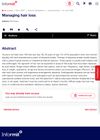2 citations
,
March 2022 in “Dermatologic Therapy” Latanoprost 0.005% solution safely increases hair density and regrowth in scalp alopecia areata.
 5 citations
,
January 2022 in “Drug Delivery”
5 citations
,
January 2022 in “Drug Delivery” Bimatoprost cream can help regrow hair in baldness.
3 citations
,
October 2021 in “Clinical, Cosmetic and Investigational Dermatology” Setipiprant did not significantly improve hair growth in men with hair loss.
 30 citations
,
April 2021 in “Journal of The American Academy of Dermatology”
30 citations
,
April 2021 in “Journal of The American Academy of Dermatology” Hair transplantation can effectively restore hair in balding areas.
7 citations
,
April 2021 in “Journal of Pharmacy and Pharmaceutical Sciences” Cetirizine 1% helps hair growth in men with no major side effects, but minoxidil 5% works better.
 4 citations
,
February 2021 in “International Journal of Dermatology”
4 citations
,
February 2021 in “International Journal of Dermatology” Prostaglandins may contribute to male hair loss; targeting them could help treat it.
 5 citations
,
January 2021 in “Journal of Cosmetic Dermatology”
5 citations
,
January 2021 in “Journal of Cosmetic Dermatology” Topical cetirizine 1% promotes hair growth in male androgenetic alopecia patients.
 12 citations
,
April 2019 in “Scientific Reports”
12 citations
,
April 2019 in “Scientific Reports” A protein called HMGB1 helps hair grow by affecting prostaglandin metabolism.
 8 citations
,
February 2019 in “Journal of The European Academy of Dermatology and Venereology” 23 citations
,
April 2018 in “PubMed”
8 citations
,
February 2019 in “Journal of The European Academy of Dermatology and Venereology” 23 citations
,
April 2018 in “PubMed” Topical finasteride reduces hair loss and promotes hair growth in men and women.
 18 citations
,
February 2018 in “International Journal of Molecular Sciences”
18 citations
,
February 2018 in “International Journal of Molecular Sciences” PGD2 increases androgen receptor activity in hair cells, which could be targeted to treat hair loss.
 21 citations
,
January 2018 in “The Korean Journal of Physiology and Pharmacology”
21 citations
,
January 2018 in “The Korean Journal of Physiology and Pharmacology” Modified stem cells from umbilical cord blood can make hair grow faster.
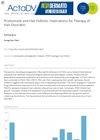 16 citations
,
November 2017 in “Acta dermato-venereologica”
16 citations
,
November 2017 in “Acta dermato-venereologica” Prostanoids, like prostaglandins and thromboxane A2, can both enhance and inhibit hair growth, and understanding their effects could help treat hair disorders.
 21 citations
,
November 2017 in “Scientific Reports”
21 citations
,
November 2017 in “Scientific Reports” Different human hair follicle stem cells grow at different rates and respond differently to a baldness-related compound.
 9 citations
,
September 2017 in “Journal of Investigative Dermatology Symposium Proceedings”
9 citations
,
September 2017 in “Journal of Investigative Dermatology Symposium Proceedings” Prostaglandin D2 increases testosterone production in skin cells through a process involving reactive oxygen species, and antioxidants may help treat hair loss.
 21 citations
,
June 2017 in “Journal of Dermatological Treatment”
21 citations
,
June 2017 in “Journal of Dermatological Treatment” Topical cetirizine improves hair density and thickness in androgenetic alopecia, but more research is needed.
 178 citations
,
April 2017 in “Journal of The American Academy of Dermatology”
178 citations
,
April 2017 in “Journal of The American Academy of Dermatology” Minoxidil, finasteride, and low-level laser light therapy effectively treat hair loss.
 11 citations
,
May 2016 in “Naunyn-Schmiedeberg's Archives of Pharmacology”
11 citations
,
May 2016 in “Naunyn-Schmiedeberg's Archives of Pharmacology” A substance called 15-deoxy prostaglandin J2 can cause hair follicle cells to die, which might explain how prostaglandin D2 can lead to hair loss.
 16 citations
,
March 2016 in “Clinical ophthalmology”
16 citations
,
March 2016 in “Clinical ophthalmology” Bimatoprost is safe and improves eyelash growth in healthy kids but not in those with eyelash loss from chemotherapy or alopecia.
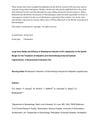 38 citations
,
October 2014 in “British journal of dermatology/British journal of dermatology, Supplement”
38 citations
,
October 2014 in “British journal of dermatology/British journal of dermatology, Supplement” Bimatoprost solution is effective and safe for long-term use in treating eyelash thinning.
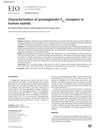 9 citations
,
August 2014 in “European journal of ophthalmology”
9 citations
,
August 2014 in “European journal of ophthalmology” PGF2α receptors in human eyelids are found in specific parts of hair follicles, explaining eyelash changes with glaucoma treatment.
 57 citations
,
February 2014 in “Experimental Dermatology”
57 citations
,
February 2014 in “Experimental Dermatology” Prostaglandin D₂ might be targeted for new male pattern baldness treatments.
 9 citations
,
January 2014 in “Medical Hypotheses”
9 citations
,
January 2014 in “Medical Hypotheses” Higher DHT in male baldness may protect against prostate cancer.
 68 citations
,
November 2012 in “Journal of Investigative Dermatology”
68 citations
,
November 2012 in “Journal of Investigative Dermatology” Prostaglandin D2 blocks new hair growth after skin injury through the Gpr44 receptor.
 115 citations
,
September 2012 in “Experimental Dermatology”
115 citations
,
September 2012 in “Experimental Dermatology” Androgens have complex effects on hair growth, promoting it in some areas but causing hair loss in others, and our understanding of this is still evolving.
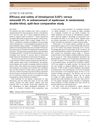 17 citations
,
May 2012 in “Journal of dermatology”
17 citations
,
May 2012 in “Journal of dermatology” Bimatoprost is slightly more effective than minoxidil for eyebrow growth, and both are safe.
 205 citations
,
March 2012 in “Science Translational Medicine”
205 citations
,
March 2012 in “Science Translational Medicine” PGD2 stops hair growth and is higher in bald men with AGA.
 81 citations
,
August 2011 in “Journal of The American Academy of Dermatology”
81 citations
,
August 2011 in “Journal of The American Academy of Dermatology” Latanoprost 0.1% may effectively treat hair loss.
 235 citations
,
January 2011 in “Journal of Clinical Investigation”
235 citations
,
January 2011 in “Journal of Clinical Investigation” Men with baldness due to androgenetic alopecia still have hair stem cells, but lack specific cells needed for hair growth.
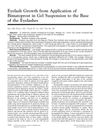 29 citations
,
May 2010 in “Ophthalmology”
29 citations
,
May 2010 in “Ophthalmology” Bimatoprost gel makes eyelashes grow longer, but may cause side effects and should be monitored by an eye doctor.
69 citations
,
April 2010 in “Clinical ophthalmology” Bimatoprost is effective for growing longer, thicker, and darker eyelashes.
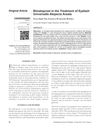 37 citations
,
January 2010 in “International Journal of Trichology”
37 citations
,
January 2010 in “International Journal of Trichology” Bimatoprost helped eyelash growth in nearly half of the patients with a type of eyelash hair loss.
 50 citations
,
December 2009 in “Journal of The European Academy of Dermatology and Venereology”
50 citations
,
December 2009 in “Journal of The European Academy of Dermatology and Venereology” Latanoprost can effectively treat eyelash hair loss, with 45% of patients showing hair regrowth and no reported side effects.
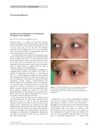 15 citations
,
November 2009 in “Clinical and Experimental Dermatology”
15 citations
,
November 2009 in “Clinical and Experimental Dermatology” Bimatoprost helped a girl grow her eyelashes back quickly and without serious side effects.
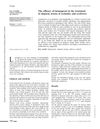 20 citations
,
November 2009 in “European Journal of Dermatology”
20 citations
,
November 2009 in “European Journal of Dermatology” Latanoprost, a glaucoma treatment, was found ineffective in treating hair loss in eyebrows and eyelashes.
 55 citations
,
March 2009 in “Journal of The American Academy of Dermatology”
55 citations
,
March 2009 in “Journal of The American Academy of Dermatology” Topical latanoprost and bimatoprost eye solutions don't help eyelash growth in people with alopecia areata.
39 citations
,
November 2007 in “Experimental dermatology” Human hair follicles contain a complex network of prostanoid receptors that may influence hair growth.
 65 citations
,
August 2007 in “Experimental Dermatology”
65 citations
,
August 2007 in “Experimental Dermatology” Human hair follicles can make and process prostaglandins, which may affect hair growth.
 36 citations
,
November 2005 in “Journal of The American Academy of Dermatology”
36 citations
,
November 2005 in “Journal of The American Academy of Dermatology” Topical latanoprost doesn't effectively regrow hair in severe eyebrow alopecia areata cases.
103 citations
,
April 2005 in “Experimental dermatology” Prostaglandin F2alpha and related compounds can increase hair growth and darken hair in mice.
41 citations
,
September 2003 in “Journal of Investigative Dermatology” Overexpression of COX-2 causes early hair loss in mice, but can be prevented with a COX-2 inhibitor.
 165 citations
,
September 2003 in “Toxicology and applied pharmacology”
165 citations
,
September 2003 in “Toxicology and applied pharmacology” Blocking COX, especially COX-2, in the skin can reduce inflammation and pain and may help prevent skin cancer.
 277 citations
,
June 2003 in “The journal of investigative dermatology. Symposium proceedings/The Journal of investigative dermatology symposium proceedings”
277 citations
,
June 2003 in “The journal of investigative dermatology. Symposium proceedings/The Journal of investigative dermatology symposium proceedings” Epithelial-mesenchymal interactions control hair growth cycles through specific molecular signals.
 165 citations
,
December 2002 in “Molecular and Cellular Endocrinology”
165 citations
,
December 2002 in “Molecular and Cellular Endocrinology” Male hormones, particularly DHT, are linked to male pattern hair loss, and treatments like finasteride can help, but they don't work for postmenopausal women's hair loss, which may have different causes.
113 citations
,
May 2002 in “PubMed” Overexpressing COX-2 in mice skin reduces skin tumor development.
23 citations
,
August 2001 in “PubMed” Finasteride reduces caspase levels, helping hair growth in AGA patients.
201 citations
,
May 2001 in “Proceedings of the National Academy of Sciences” Overexpression of COX-2 in mice skin causes abnormal skin and hair development.
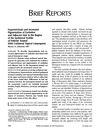 216 citations
,
October 1997 in “American Journal of Ophthalmology”
216 citations
,
October 1997 in “American Journal of Ophthalmology” Using the eye pressure medication latanoprost can cause excessive hair growth and darker eyelashes on the treated eye.







































